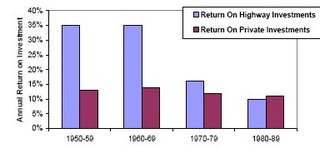 The Victoria Transport Policy Institute has published a report, “Smart Transportation Investments: Reevaluating the Role of Highway Expansion for Improving Transportation.” This study argues that investment in urban highway capacity suffers from the law of diminishing returns. Early investments generated a high return on investment. But comparable investments today will generate a much lower rate of return.
The Victoria Transport Policy Institute has published a report, “Smart Transportation Investments: Reevaluating the Role of Highway Expansion for Improving Transportation.” This study argues that investment in urban highway capacity suffers from the law of diminishing returns. Early investments generated a high return on investment. But comparable investments today will generate a much lower rate of return.
The paper summarizes the issues thusly:
- “The first highway projects are generally the most cost effective because planners are smart enough to prioritize investments. For example, if there are several possible highway alignments on a corridor, those with the greatest benefits and lowest costs are generally built first, leaving less cost effective options for subsequent implementation.
- “Interregional highways (those connecting cities) are generally constructed first. They tend to provide greater economic benefits and have lower unit costs than local highway expansion, due to numerous conflicts and high land costs in urban areas.
- “Adding capacity tends to provide declining user benefits, since consumers are smart enough to prioritize trips. For example, if highways are congested, consumers organize their lives to avoid peak automobile period trips. As highway capacity increases, they travel more during peak periods, perhaps driving across town during rush hour for an errand that would be deferred, or moving further away from their worksite. Each additional vehicle mile provides smaller user benefits, since the most valued vehicle-miles are already taken.”
The chart at the top of the post shows the declining rate of return on dollars invested in highways. As recently as the 1970s, public investment in highways generated higher returns than did private capital. By the 1990s, however, the return on highway investment trailed the return on private investment, representing a loss of economic efficiency.
That’s not to say that carefully selected individual highway improvements won’t be economically efficient. But any large-scale plan by a state, city or region to build its way out of traffic congestion is likely to be very inefficient.


